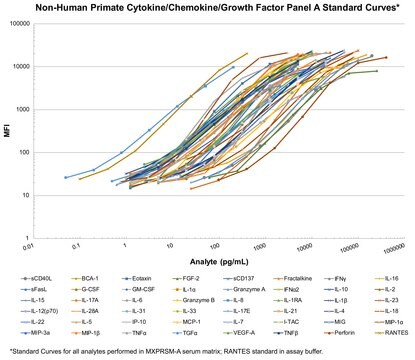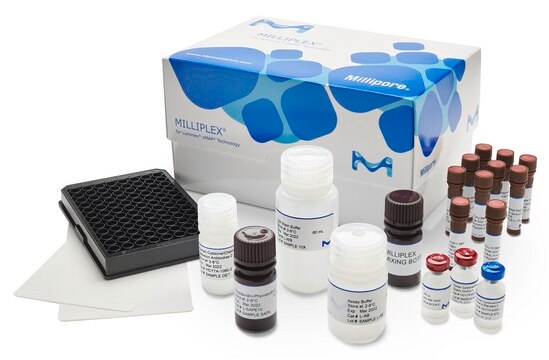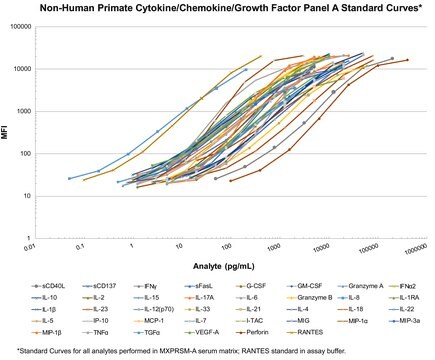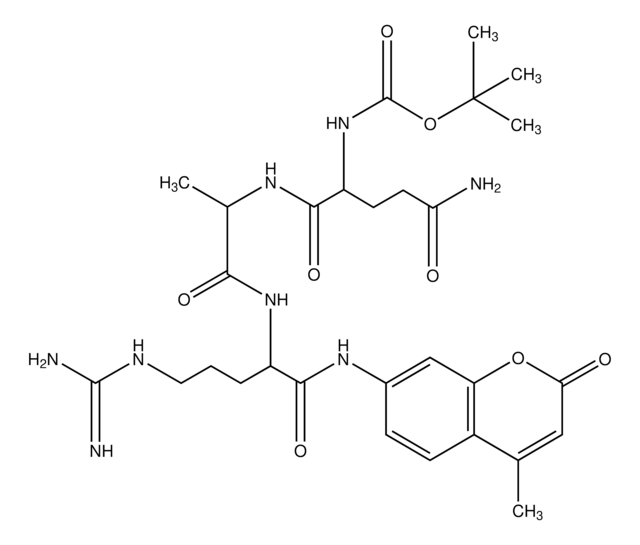PF078
Heparin Binding Epidermal Growth Factor, Human, Recombinant, S. frugiperda
Synonym(s):
HB-EGF
Sign Into View Organizational & Contract Pricing
All Photos(1)
About This Item
UNSPSC Code:
12352202
Recommended Products
Assay
≥97% (SDS-PAGE)
Quality Level
form
solid
manufacturer/tradename
Calbiochem®
storage condition
OK to freeze
avoid repeated freeze/thaw cycles
impurities
≤1 EU/μg Endotoxins (EU/μg cytokine)
shipped in
wet ice
storage temp.
−20°C
General description
Recombinant, human heparin binding epidermal growth factor expressed in S. frugiperda insect cells. The mature HB-EGF is a human recombinant protein whose DNA sequence encoding the N-terminal 148 amino acid residues of human HB-EGF precursor was expressed in Sf 21 insect cells using a baculovirus expression system. The mature recombinant protein (86 amino acids) generated by the removal of the 62 amino acid residue signal and propeptide has a predicted molecular mass of ~9.5 kDa. The recombinant protein is heterogeneously O-glycosylated and migrates as an ~12 kDa protein in SDS-PAGE. Heparin-binding epidermal growth factor-like growth factor (HB-EGF) is a ~22 kDa O-glycosylated protein that is a potent mitogen and chemoattractant for vascular smooth muscle cells, fibroblasts, and epithelial cells but not endothelial cells. The natural protein has an apparent molecular mass of ~19-23 kDa and exists in multiple forms as a result of heterogeneous O-glycosylation and/or N-terminal truncation. HB-EGF is synthesized as a membrane-anchored precursor (proHB-EGF) that is proteolytically cleaved to release the soluble mature growth factor. The two forms are active as juxtacrine and paracrine/autocrine growth factors respectively. Recent studies show MMP-3 as one of the enzymes that cleaves HB-EGF implicating a role for MMP-3 in the regulation of HB-EGF from being a juxtacrine to a paracrine/autocrine factor. HB-EGF activates two EGF receptor subtypes, HER1/ErbB1, and HER4 and binds to heparan sulfate proteoglycan. The proHB-EGF is postulated as the high affinity receptor for diphtheria toxin (DT). Recent evidence suggests that the coexpression of proHB-EGF and CD9 on macrophages may strongly promote the development of atherosclerosis by a juxtacrine mechanism. Transcription of HB-EGF can be induced in vascular endothelial cells as well as aortic smooth muscle cells which may also play an important role in the pathogenesis of atherosclerosis. Useful for proliferation studies.
Recombinant, human heparin binding epidermal growth factor expressed in S. frugiperda insect cells. The mature HB-EGF is generated by the removal of the 62 amino acid (~9.5 kDa) signal. Protein is heterogeneously O-glycosylated and migrates as an ~12 kDa protein in SDS-PAGE. Titrate the protein for optimal results in individual systems.
Biochem/physiol Actions
EC₅₀ of 2-5 ng/ml as measured by its ability to stimulate ³H-thymidine incorporation in the EGF-responsive fibroblast cell line, Balb/3T3
Warning
Toxicity: Standard Handling (A)
Physical form
Lyophilized from a sterile-filtered PBS solution, 50 µg of BSA/µg of cytokine, pH 7.4.
Reconstitution
Reconstitute in PBS to ≥1 µg/ml containing ≥0.1%HSA or BSA.
Other Notes
Davis-Fleischer, K.M. and Besner, G.E. 1998. Front. Biosci.3, D288.
Ouchi, N., et al. 1997. Biochem. J.328, 923.
Raab, G. and Klagsbrun, M. 1997. Biochim. Biophys. Acta1333, F179.
Suzuki, M., et al. 1997. J. Biol. Chem.272, 31730.
Nakata, A., et al. 1996. Circulation94, 2778.
Miyagawa, J., et al. 1995. J. Clin. Invest.95, 404.
Higashiyama, S., et al. 1991. Science251, 936.
Ouchi, N., et al. 1997. Biochem. J.328, 923.
Raab, G. and Klagsbrun, M. 1997. Biochim. Biophys. Acta1333, F179.
Suzuki, M., et al. 1997. J. Biol. Chem.272, 31730.
Nakata, A., et al. 1996. Circulation94, 2778.
Miyagawa, J., et al. 1995. J. Clin. Invest.95, 404.
Higashiyama, S., et al. 1991. Science251, 936.
Legal Information
CALBIOCHEM is a registered trademark of Merck KGaA, Darmstadt, Germany
Storage Class Code
11 - Combustible Solids
WGK
WGK 3
Certificates of Analysis (COA)
Search for Certificates of Analysis (COA) by entering the products Lot/Batch Number. Lot and Batch Numbers can be found on a product’s label following the words ‘Lot’ or ‘Batch’.
Already Own This Product?
Find documentation for the products that you have recently purchased in the Document Library.
Michael A Tolino et al.
Biochimica et biophysica acta, 1810(9), 875-878 (2011-06-07)
Heparin-binding EGF-like growth factor (HB-EGF) contains, in contrast to EGF, a domain that binds to negatively charged glycans on cell surfaces and in extracellular matrix. We speculated that a short exposure to HB-EGF induces prolonged biological effects such as healing
Our team of scientists has experience in all areas of research including Life Science, Material Science, Chemical Synthesis, Chromatography, Analytical and many others.
Contact Technical Service







